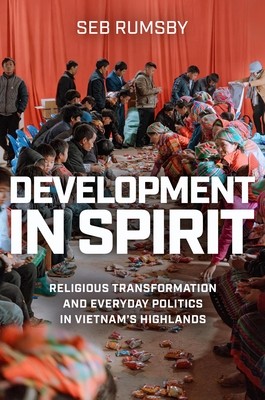
- We will send in 10–14 business days.
- Author: Seb Rumsby
- Publisher: University of Wisconsin Press
- ISBN-10: 0299342301
- ISBN-13: 9780299342302
- Format: 15.2 x 22.9 x 1.4 cm, kieti viršeliai
- Language: English
- SAVE -10% with code: EXTRA
Reviews
Description
As state economic policies promote integration under a single logic of modernist development, many impoverished groups remain on the margins. Development in Spirit explores the practices employed by communities on the fringes of such nation-building projects. Using an everyday political economy lens, Seb Rumsby demonstrates how seemingly powerless actors actively engage with larger forces, shaping their experience of development in ways that are underexamined but have far-reaching consequences.
Following state-led market reforms in the 1980s, Vietnam experienced stunning economic transformation. But for the Hmong communities of the country's north and central highlands, the benefits proved elusive. Instead, the Hmong people have pursued their own alternative paths to development. Rumsby shows how mass conversion to Christianity led to a case of "unplanned development" that put the Hmong on a trajectory of simultaneous integration into the market economy and resistance to state authority. Many of the strategies community members employ are tied to the Christianization of everyday life. Religious actors play complex and often contradictory roles in facilitating networks of exchange, challenging or enforcing gender norms, promoting communalism and enforcing discipline, and shaping local ideas about progress. They are influenced by national and transnational religious networks, especially US-produced radio broadcasts by Hmong American Christians and local converts. This compelling account provides fresh theoretical and empirical insights into the interplay of religion, neoliberal development, and marketization across the world.EXTRA 10 % discount with code: EXTRA
The promotion ends in 23d.11:56:09
The discount code is valid when purchasing from 10 €. Discounts do not stack.
- Author: Seb Rumsby
- Publisher: University of Wisconsin Press
- ISBN-10: 0299342301
- ISBN-13: 9780299342302
- Format: 15.2 x 22.9 x 1.4 cm, kieti viršeliai
- Language: English English
As state economic policies promote integration under a single logic of modernist development, many impoverished groups remain on the margins. Development in Spirit explores the practices employed by communities on the fringes of such nation-building projects. Using an everyday political economy lens, Seb Rumsby demonstrates how seemingly powerless actors actively engage with larger forces, shaping their experience of development in ways that are underexamined but have far-reaching consequences.
Following state-led market reforms in the 1980s, Vietnam experienced stunning economic transformation. But for the Hmong communities of the country's north and central highlands, the benefits proved elusive. Instead, the Hmong people have pursued their own alternative paths to development. Rumsby shows how mass conversion to Christianity led to a case of "unplanned development" that put the Hmong on a trajectory of simultaneous integration into the market economy and resistance to state authority. Many of the strategies community members employ are tied to the Christianization of everyday life. Religious actors play complex and often contradictory roles in facilitating networks of exchange, challenging or enforcing gender norms, promoting communalism and enforcing discipline, and shaping local ideas about progress. They are influenced by national and transnational religious networks, especially US-produced radio broadcasts by Hmong American Christians and local converts. This compelling account provides fresh theoretical and empirical insights into the interplay of religion, neoliberal development, and marketization across the world.

Reviews